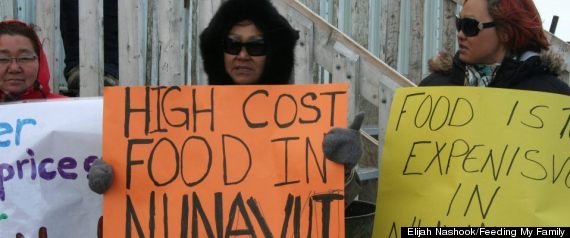ARCTIC CANADA FOOD PRICES ARE OUT OF CONTROL!

"Old Mother Hubbard went to the cupboard to get her poor dog a bone. But when she got there, the cupboard was bare..."
There is a place where Old Mother Hubbard's predicament is a fact of life. In this place, 70 per cent of pre-school children do not have daily access to nutritious food, and 60 per cent of adults said there are days their family has no food at all. Children forage in dumps for expired food discarded by stores.
We've seen food insecurity in many parts of the developing world. However the place we're talking about isn't in the developing world -- it's in Canada.
The rate of food insecurity in Canadian Arctic communities is six times the national average, according to Inuit Tapiriit Kanatami (ITK), an organization that represents Canadian Inuit. It is the highest rate of food insecurity in the world for an Aboriginal people living in a developed country. The World Health Organization defines food insecurity as a lack of access to "sufficient, safe, nutritious food to maintain a healthy and active life."
More compelling than statistics are the stories and photos on the Facebook page "Feeding My Family." A single mother says she goes without meals so her children can eat; parents keep their kids home from school because they don't want to send them on an empty stomach; a family admits to visiting relatives just to get a meal.
Inuit cousins Leesee Papatsie and Eric Joamie were outraged with the hunger prevalent in their communities. They turned to Facebook to give Inuit communities a voice and make the rest of Canada aware of the food crisis they face. Within 10 days of its debut, "Feeding My Family" had gained more than 10,000 Facebook followers.
Papatsie and Joamie believe Canadians would be shocked to learn what food costs in Canada's Arctic territories. We certainly were shocked when we visited Iqaluit, but even more so by the photos posted by Inuit shoppers in other communities in Nunavut's Baffin region. The price label on a head of cabbage in Arctic Bay was $28.54; the tag below a flat of six cans of concentrated orange juice in Igloolik read $51.89, and a 24-pack of bottled water in Clyde River was a mind-blowing $104.99!

Food is expensive because it must be flown in to remote communities from cities such as Winnipeg, Montreal and Ottawa. A federal government program--Nutrition North Canada--provides subsidies for some food products. However the Nunavut and the Northwest Territories governments say consumers are not benefitting from the subsidies and have called for the Auditor General to investigate the program.
High food prices devastate Inuit families. According to a study published by the American Society for Nutrition in 2012, the average weekly cost of groceries for a family of four is $380. The study found that almost half of Inuit adults earn about $20,000 a year, but shell out more than $19,000 annually for food.
Papatsie explained this leads to a vicious cycle where one grocery bill devours most of a paycheque so people must borrow to make it to the next payday. Come that payday they must pay off the debt, leaving even less money to buy food and creating the need to borrow even more. In Jaomie's community of Pangnirtung, 300 km north of Iqaluit, people phone radio talk shows pleading for listeners to loan them money or donate food.
The only reason people haven't starved, said Papatsie, is because the Inuit communities traditionally share with those in need, and because they can hunt to make up the shortfall.
But even hunting may soon fail to meet the desperate need. The cost of buying and maintaining hunting equipment and the snowmobiles necessary for travelling far out onto the tundra can be tens of thousands of dollars--out of reach for many, Joamie said. And for those who are able to hunt, the chances of finding game are decreasing. According to the ITK, over the last 20 years Nunavut and the Northwest Territories have seen a reduction in caribou herds--one of the primary traditional Inuit sources of food--with population declines as high as 95 per cent in some areas.

The food situation in Canada's Arctic is garnering international attention. On the "Feeding My Family" Facebook page people from around the world express shock that such a situation could exist in a developed country. Last December, the United Nations Special Rapporteur on the Right to Food criticized Canada for failing to adequately address Inuit food security.
The Government of Canada must work with Arctic communities to ensure that programs intended to provide affordable access to nutritious food actually work. And Canada is long overdue in developing a national food policy that recognizes access to food as a basic human right.
In a rich country like ours, Mother Hubbard should be a nursery rhyme, not a real-life horror story.




No comments:
Post a Comment
Enter your comment(s) here...